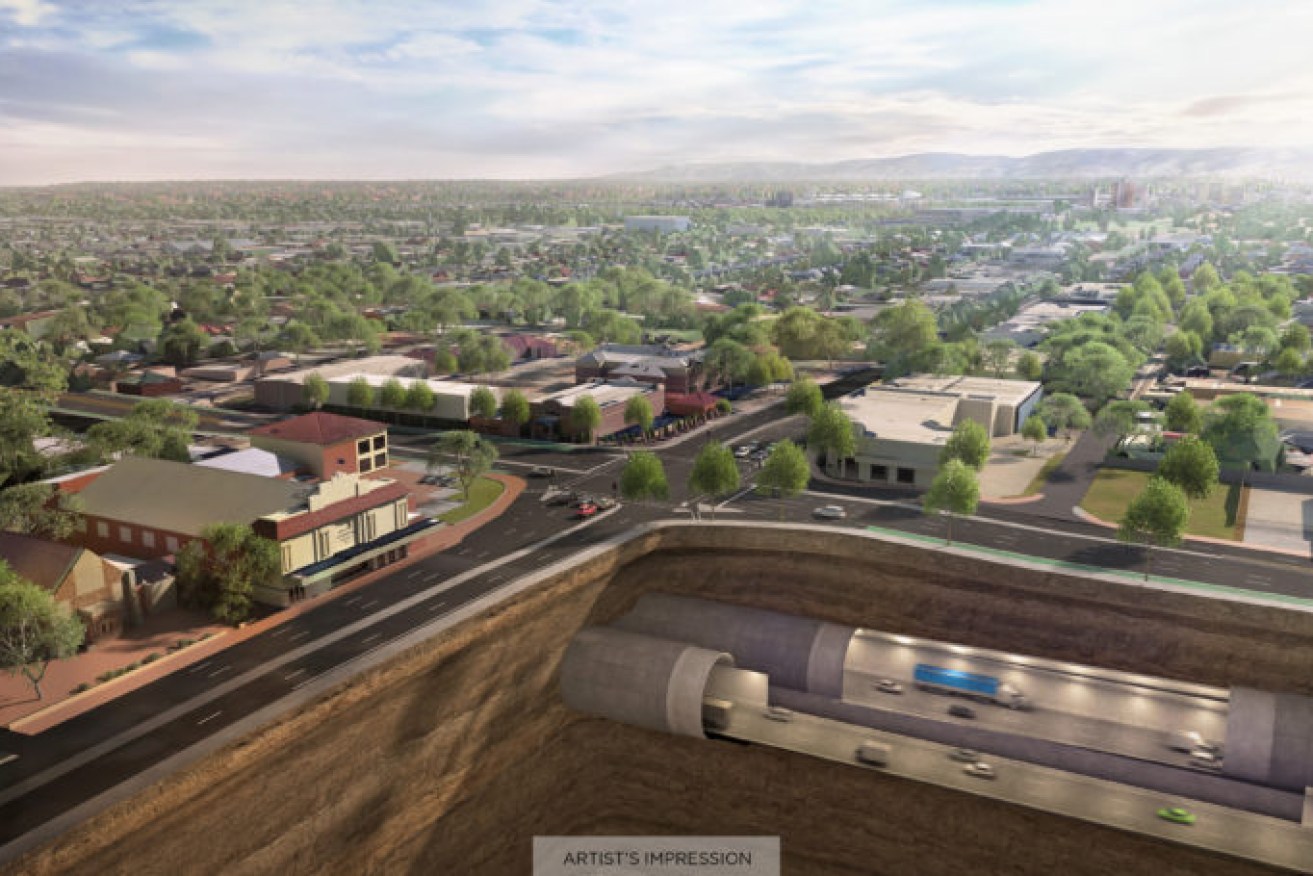Local construction industry wants in on South Rd upgrade
South Australia’s construction industry is hoping for a substantial piece of the “staggering” amount of material procurement on offer for the final tunnelling stage of the North-South Corridor, amid calls for a broader rethink of how the State Government tenders to local companies.


An artist's rendition of the 4km tunnels under South Road as part of the final stage of the 78km North-South Corridor (Photo: supplied/State Government)
The State Government revealed last week that the final 10.5km stage of the 78km North-South Corridor project will require:
- 760,000 cubic metres of concrete
- 470,000 tonnes of asphalt
- 470,000 litres of bitumen
- 100,000 tonnes of steel and,
- 2 million tonnes of quarry products.
The materials will be used to support the construction of a 4.3km tunnel from Darlington to the South Road tram bridge, 1km of lowered motorway under the Glenelg Tramline and Anzac Highway, and another 2km tunnel under Sir Donald Bradman Drive to West Thebarton Road.
Minister for Infrastructure and Transport Corey Wingard – who unveiled the material quantities required for the project at the 2021 Annual Construction Briefing on Wednesday – said the State Government would try to source materials locally “where practical”.
“The amount of material that’s going to be needed is staggering and where practical we’ll try to source it locally which provides a great opportunity for SA businesses,” Wingard said.
“This discussion with the sector outlines the pipeline of works ahead and will give local firms the time to scale up their operations to be in the best place possible to be part of this huge project.”
From a raw materials point of view, South Australia is well placed to produce much of the materials. Adelaide-based Adbri is the largest producer of lime and concrete products in Australia, the second largest cement and clinker supplier to the construction sector and the fourth largest concrete and aggregate producer.
Sanjeev Gupta’s GFG Alliance is also likely to be a candidate to provide steel for the project from its Whyalla steelworks, which is fed by South Australian iron ore.
Construction on the final stage of the North-South Corridor is not slated to start until 2023 and the government is yet to go out to tender on materials and contractors.
Just over $150 million is budgeted for the $9.9 billion project this financial year.
Civil Contractors Federation SA CEO Rebecca Pickering, whose peak body represents more than 500 South Australian contractors, said transparency from the State Government on major transport projects will be “critical” for the construction industry.
“Ideally, civil contractors would advocate that we want as much as possible procured locally – particularly with regards to supplying material,” she said.
“We’ve got active engagement with the Department across all sectors of our industry looking at how we can come up with solutions and prepare ourselves – particularly with the tunnel project.”
She said the association was “certainly seeing more positives” in the State Government’s procurement process in comparison to past projects.
Asked whether the CCFSA would like to see a percentage of the North-South Corridor’s construction materials earmarked for local procurement, Pickering said: “We’d always love to see firm commitments from Government but we understand that can be difficult.”
“We’ve got to work through scopes of work and those sorts of things and how this project will be broken down into smaller packages,” she said.
“It was certainly positive to hear [at the Annual Construction Briefing] that the Department is actually looking to chunk down the project, so provide those opportunities for local contractors on such a big project.”
The North-South Corridor tendering opportunity comes after Business SA called for a rethink of the State Government’s procurement policies in their pre-election Charter22 policy paper.
Among the recommendations from the chamber of commerce is for Department CEOs to be required to write “exception notices” to explain why they selected interstate businesses for State Government tenders.
Other recommendations include a pre-registration system for government contracts and increased transparency on future procurement needs.
The peak industry body also notes that the Department of Infrastructure and Transport is the only State Government Department with a “forward-looking” procurement plan.
Business SA Director of Policy and Advocacy Andrew McKenna said the nature of the North-South Corridor project would lend itself to lots of opportunities for local businesses.
“The North-South Corridor is probably going to be a bit of a different proposition in that it’s such a significant contract and there will be a lot of subcontractors.
“There’ll no doubt be a lot of local businesses that are sort of able to benefit through those subcontracts.
“We’re not saying that those major contracts should just be split up to filter out to smaller businesses, because the real world doesn’t work like that.
“But a lot of our recommendations are more about how are we ensuring as much as possible that the local companies, particularly the smaller ones, aren’t prohibitively excluded from competing for a contract.”
The State Government spends more than $11 billion on procurement each year, accounting for around 10 per cent of gross state product.
The Department of Infrastructure and Transport’s allocated project delivery spend for this financial year is $1.3 billion.




